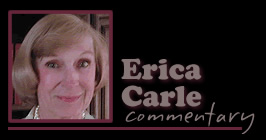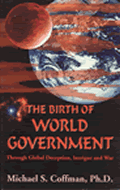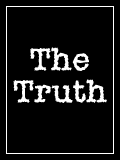Other Carle Articles:
Government
Religion In The
United States
The
Chamber Of Commerce:
It's Power And Goals
Control The Environment To Control Humanity
Universal Brotherhood And The Drive For World Unity
SOCIOLOGY HATES CHRISTIANITY
Erica
Carle
November 21, 2007
NewsWithViews.com
Many people are fooled by the term, �social science.� The use of the word, �science� tends to influence them in favor of whatever idea is being promoted. Sociologist, Lester Ward, explained the power of the word, �science� in his Outline of Sociology written in 1897:
�The power of established truth is immense. This is chiefly because no one wants to be found ignorant of, or opposed to, that which has been proved to be true. A mere theory will make little headway, because no one will feel any humiliation in either not knowing it or not accepting it. But when the indications fairly set in that it is something scientifically demonstrated, ignorance becomes a disgrace and non-acceptance a proof of ignorance. A rivalry springs up both to know and to embrace, and thousands who have only meager acquaintance with such truths openly defend them. . . P208
That is the kind of power Ward wanted for sociology, he wrote:
�It is further beyond question that when the true science of society shall be established and accepted as other sciences are accepted, its influence on the interests of man and the destiny of the race will be as much greater than that of the simpler sciences as sociology is nearer to man and more intimately bound up with all that concerns his welfare.� P212
More then 100 years have passed since Ward admitted that sociology was not established as a true science, but nothing has really changed. Today sociology remains more of a roadblock to intelligent human knowledge and behavior than a useful science. And it is a point of view which hates Christianity. Sociology acknowledges groups, but denies the importance of individuals. It sets up systems to control our human environment, behavior, goals, and emotions, but ignores the possibility that most people, if they are properly educated, can develop self control which frees them to set their own goals and enables them to govern their own emotions and behavior in a productive manner.
Economic, social, and psychological theorists with their limited information and their immense egos theorize about how the world and its people ought to function. Then they work with political theorists and mathematicians to concoct systems and legislation to manage people in accord with theoretical objectives. The goal these social theorists seek can be expressed in a single word, UNITY. In sociological jargon �progress� means PROGRESS TOWARD UNITY.
Theorists in the �social sciences� have a special way of looking at their fellow humans. Kenneth E. Boulding explained in Principles of Economic Policy, published by Prentice Hall in 1958: The theorists look at others: �. . . somewhat as the biologists look at the �society� of all living things. This is known as the �ecological approach.� . . . Human society can be regarded as an ecological system or �ecosystem,� something like a great pond, filled not with fish and frogs, plants and bacteria, but with workers and employers, gas stations and power companies, counties, states, and nations, churches and lodges, automobiles and refrigerators, wheat and steel and uranium, and all the innumerable �species� of social life, organizations, households, businesses and commodities of all kinds.�
The theorists set out many years ago to control their �ecosystem.� They promote the policies which they expect will be useful in bringing about a systematized controllable UNITY. �Policy,� Boulding said, �is the deliberate distortion of the ecosystem in favor of the objectives of the policy maker. . We can regard social or economic policy on a broader scale as a kind of �social agriculture�; a deliberate distortion of the �natural� organization of society in favor of the objectives of the policy maker.� (P. 17, 18)
Some years ago there was an automobile commercial on TV featuring astronaut Neil A. Armstrong. He said, �Long ago I learned that all engineering is a matter of designing machines to solve problems. . . �
Social engineers do just the opposite. They use problems to design systems to engineer people. Some people are foolish enough to believe that sociologists love, respect, and want to help them solve their problems. Not so! The social scientists love the problems because problems give them a chance to engineer people. Human engineering is impossible without problems.
If a group of people has no problems, sociologists will create them and suggest them because that is their entry into other people�s lives. Once a problem is discovered or created, people can be organized into sociologically-controlled groups to confront each other. The control is the goal. The problems are merely the means. In 1897 sociologist Lester Ward explained this too:
�Intelligence works exclusively through means, and only in so far as it does this does it employ the final cause. Instead of seeking the thing desired it seeks some other thing, unimportant in itself, whose attainment it perceives will secure the thing desired.�
SOCIOLOGY�S SIMPLE PRINCIPLE
�What the intelligent agent does is to place the thing he desires but lacks the power to move into the current of such a force which moves it for him. This is the type of teleological action. It is illustrated in the simplest form by the lumberman who puts his logs into the river and lets the current float them to their destination. But the most complicated cases may, by proper analysis, be reduced to this simple principle.�
Ever since the �social sciences� became prominent in education, religion, business, and politics in the latter part of the Nineteenth Century we have witnessed frequent and continual efforts on the part of social theorists to deliberately �distort the ecosystem� in favor of the objectives they have chosen.
Wars, riots, strikes, inflations, depressions, government programs and taxes have been used in the Twentieth Century to achieve the theorist�s objectives, which in every area is UNITY--uniting all separate entities into ONE BODY so they can be controlled by ONE HEAD.
Maintaining the power of the HEAD depends on keeping the system in continual conflict so the �fish and frogs� can be organized into groups to fight each other. Individual, family, and business independence is like chaos to a system planner. System planners must form people into groups to control them and the resources they manage.
Nothing gets people to form groups more effectively than conflict, so collective conflict is alternately stimulated and then resolved. The �science� of stimulating conflict has been well developed and much used in the past 100 years. Continual conflict is necessary if the collective HEAD is to rule a UNITED BODY. Such conflict has to be set up so that it is almost impossible for those involved to resolve it without help from the �social scientists� and mediators.
Unless conflict can be prolonged until it is solved by such system-dominated organizations and individuals as the International Chamber of Commerce, the United Nations, or selected university professors, it is useless to the theorists and planners They can not gain power from a privately-resolved conflict. This is why the word �peace� has a different meaning to theorists such as Boulding than it has for you and me.
Boulding said: �. . . there is a growing skill in what might be called creative rather than destructive conflict, even at the level of world society. It is not too much to hope that this process might go on until peace--meaning a process of continuous, creative resolution of conflict--becomes a settled habit of mind and a secure institution of society on a worldwide scale.� P. 432
No form of conflict is more useful to planners for world UNITY than war. War forces people to forget their individual obligations in favor of collective conflict. It also helps planners consolidate science, industry, finance and education under central management. In addition it enables planners to transport refugees from one country to another, offering many more opportunities for creative resolution of conflict.
Obviously, if we are to be governed by social policy makers as if we were fish and frogs, we have to lose our own will and identity. We have to submit to the collective will and the social body as HEADED by the �social science� theorists. We have to be taught in such a way as to develop a slave mentality obedient to the Brotherhood of Man.
The ideal type of person for the new world order is one who functions on an animal level, who can be managed through the application of pleasure/pain psychology--one who can be predictably controlled by manipulation of his environment or �ecosystem.� To foster a slave mentality the thinking functions of our brains must be trained to obedience, and the self-control functions must be destroyed or put to sleep.
Observing the Ten Commandments requires self control. Obviously, if sociological goals are to be accomplished, the Ten Commandments have to be eliminated. This is one example of sociology�s SIMPLE PRINCIPLE. The goal is to rid humanity of individual self control. One of the means is to get rid of the Ten Commandments. The Commandments are the logs sociology tosses in the river. Destruction of self control is the thing desired after the logs arrive at the saw mill.
Knowledge of the brain and how it functions has been one of the best kept secrets of the past 150 years. This was no happenstance. If intelligent people had realized how easily clever manipulators can influence thinking through the use of suggestion, and by focusing the attention on a DOMINANT IDEA, populations with the mentality of slaves would not have been so easy to develop. Generations of human automata have been the desired result of much Twentieth Century psychological teaching.
People talk about freedom and self control, but no freedom of thought, emotion, or action is possible in a society governed by what is called �social science.� Sociological experimentation and control rob people of their right to pursue individual goals. Group emotions replace intelligence and reason. Contrived relationships replace personal choices.
Social science is an intentional destroyer of Christianity, yet schools and colleges that are supposed to be Christian teach and study social science as if it were a worthwhile discipline rather than a tragic showcase of the ways in which carnal man can be manipulated.
That Auguste Comte intended to destroy Christianity with his sociology, Religion of Humanity and Positivism was never a secret or in doubt. He said it many times in many ways:
THE OBJECT OF OUR PHILOSOPHY IS TO DIRECT THE SPIRITUAL REORGANISATION OF THE CIVILIZED WORLD
|
Subscribe to the NewsWithViews Daily News Alerts! |
Strange as it may seem, nearly all Christian schools and colleges teach and support the social sciences. Christians need not complain about what government is doing to them until they stop doing worse things to themselves--until they put their own houses in order by getting rid of sociology as a science. If Christian schools and colleges, were to teach the history and the meaning of the conflict between social sciences and Christianity, rather than teaching the social sciences as academic disciplines, they might yet escape the fate which awaits the house divided against itself.
SOCIOLOGY HATES CHRISTIANITY!
� 2007 Erica Carle - All Rights Reserved
Erica Carle is an independent researcher and writer. She has a B.S. degree from the University of Wisconsin. She has been involved in radio and television writing and production, and has also taught math and composition at the private school her children attended in Brookfield, Wisconsin. For ten years she wrote a weekly column, "Truth In Education" for WISCONSIN REPORT, and served as Education Editor for that publication.
Her books are GIVE US THE YOUNG--$5 Plus $2.00 P&H WHY THINGS ARE THE WAY THEY ARE--$16 PLUS $4.00 P&H BOTH BOOKS -- $25 Total. A loose leaf collection of quotes titled, SIX GENERATIONS TO SERFDOM is also available--$15 Plus $2.00 P&H. Mailing address: Erica Carle; PO Box 261; Elm Grove, WI 53122.
E-mail: ericacarle@sbcglobal.net
Obviously, if we are to be governed by social policy makers as if we were fish and frogs, we have to lose our own will and identity.













